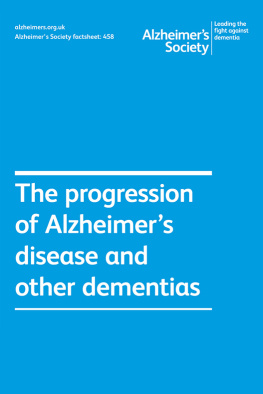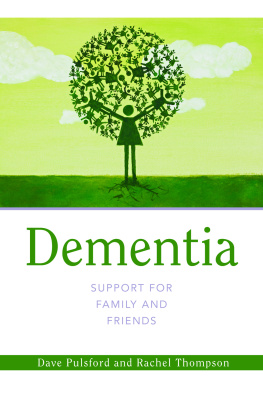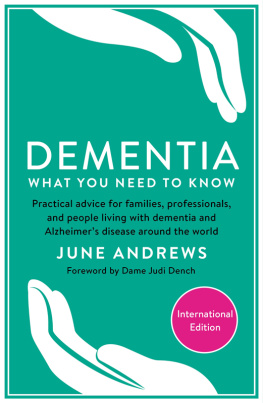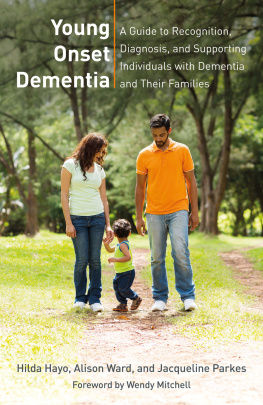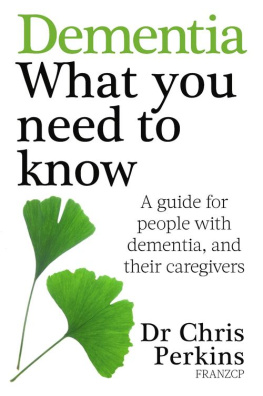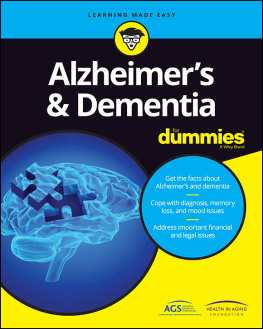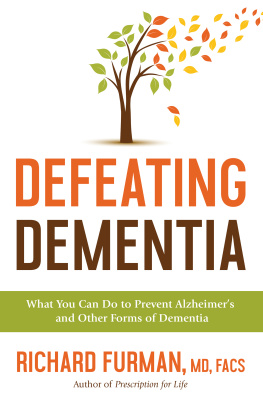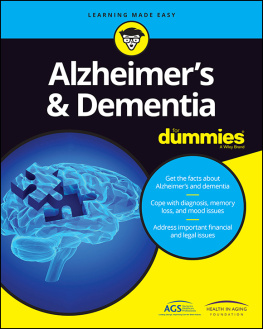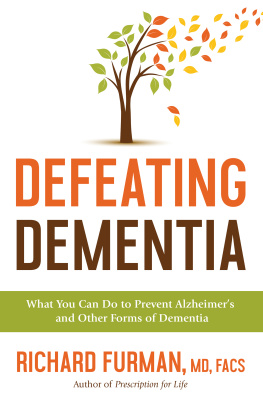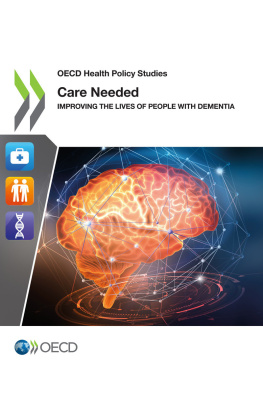About this guide
This guide is for anyone who has recently been told they have dementia. This could be any type of dementia, such as Alzheimers disease, vascular dementia or mixed dementia.
It will also be useful to close friends and family of someone with dementia, as it contains information for anyone taking on a caring role.
The booklet will help people to understand more about dementia and the treatments, support and services that are available. It includes information about living as well as possible with dementia and about making plans for the future.
You might choose to read the whole booklet, or, if you prefer, focus on the parts that seem most relevant to you. Each section starts with summarised key points. These have been included for people who may prefer to read an overview of the section rather than the whole thing.
You will find a checklist in . It lists some of the things discussed throughout this guide that you can do to help you live well now and plan for the future.
This guide has been produced by Alzheimers Society with support and funding from the Department of Health.
A diagnosis of dementia can cause a range of emotions. The news might come as a shock, or, for some people, it may bring a sense of relief as it provides an explanation for the problems they have been experiencing. It can also have a big impact on family and friends.
If you, or someone close to you, have recently been diagnosed with dementia, you might be feeling sad, fearful, lost, alone, angry or even disbelief. Everyone is different, but all these reactions are possible at different times and they are all normal. How you feel will probably vary from one day to the next.
We went out and celebrated when I was diagnosed, because I finally knew what was wrong with me. I could tell people I have Picks disease.
Graham, East Sussex, living with Picks disease
(frontotemporal dementia)
Even though we expected it, our first reaction was to be frightened and upset. I think [my husband] thought it diminished him as a person and felt ashamed. But time has changed that, because it hasnt diminished him in any way.
Brenda, West Sussex, carer for a person with Alzheimers disease
If you can, talk to friends and family about how youre feeling. Other people need to understand what youre going through. They might be finding things hard too, so talking can help both you and them. There are also specialist health and social care professionals you can talk to for support.
You will find a list of Alzheimers Society services in .
If youd like to talk about the information in this guide, please phone Alzheimers Societys National Dementia Helpline on 0300 222 1122 calls are charged at a low-cost rate. The Helpline is for anyone affected by dementia and is open 9am8pm MondayWednesday, 9am5pm ThursdayFriday, 10am4pm SaturdaySunday. Trained helpline advisers can provide you with information, support, guidance and signposting to other appropriate organisations.
Throughout this booklet you will see suggestions for Alzheimers Society factsheets. You can order at alzheimers.org.uk/factsheets . For factsheets specific to Northern Ireland, please contact your local Alzheimers Society office.
Its important to know that you arent alone about 850,000 people in the UK have dementia. Its possible to live well with dementia and there is support available for you and your family.
Contents
About dementia
In this section
Key points: About dementia
Dementia occurs when the brain is affected by a disease. Its not a normal part of ageing.
Dementia affects everyone differently and can cause a wide range of symptoms. These can include problems with memory, thinking, concentration and language. People may become confused or struggle with how they perceive things. Dementia can also cause changes in mood or emotions and affect how someone behaves.
Dementia is progressive, which means that symptoms get worse over time. However, many people with dementia lead active and fulfilling lives for many years.
There are many different types of dementia. The most common are Alzheimers disease and vascular dementia, which are sometimes combined (called mixed dementia). Less common are dementia with Lewy bodies and frontotemporal dementia.
There are also some rarer conditions that cause dementia. Together, they account for only about five per cent of all people with dementia.
Various factors increase the risk of someone developing dementia. Ageing, genes, health and lifestyle all play a part.
Most people with dementia are over 65 years of age, but dementia does also affect younger people.
Some people are diagnosed with a condition called mild cognitive impairment (MCI). This causes symptoms that are similar to dementia, but arent as serious. People with MCI have a higher risk of developing dementia, but not all of them will.
What is dementia?
The word dementia describes a group of symptoms that may include memory loss, difficulties with thinking, problem-solving or language, and sometimes changes in mood or behaviour. These changes are often small to start with, but for someone with dementia they have become bad enough to affect daily life.
Dementia isnt a natural part of ageing. It occurs when the brain is affected by a disease.
There are many known causes of dementia probably more than 100. The most common types are Alzheimers disease and vascular dementia. Some people have a combination of these, known as mixed dementia. To find out more, see .
About dementia
- There are around 850,000 people in the UK who have dementia.
- The chance of developing dementia increases significantly with age. One in 14 people over 65 years of age, and one in six people over 80, has dementia. It is more common among women than men.
- More than 40,000 younger people (under the age of 65) in the UK have dementia. This is called early-onset or young-onset dementia.
What are the symptoms?
Everyone experiences dementia in their own way. Different types of dementia can also affect people differently. However, there are some common symptoms that are listed below.
Memory loss:
- problems recalling things that happened recently (although some people easily remember things from a long time ago)
- repeating themselves (such as asking the same question over and over).
Difficulty thinking things through and planning:


